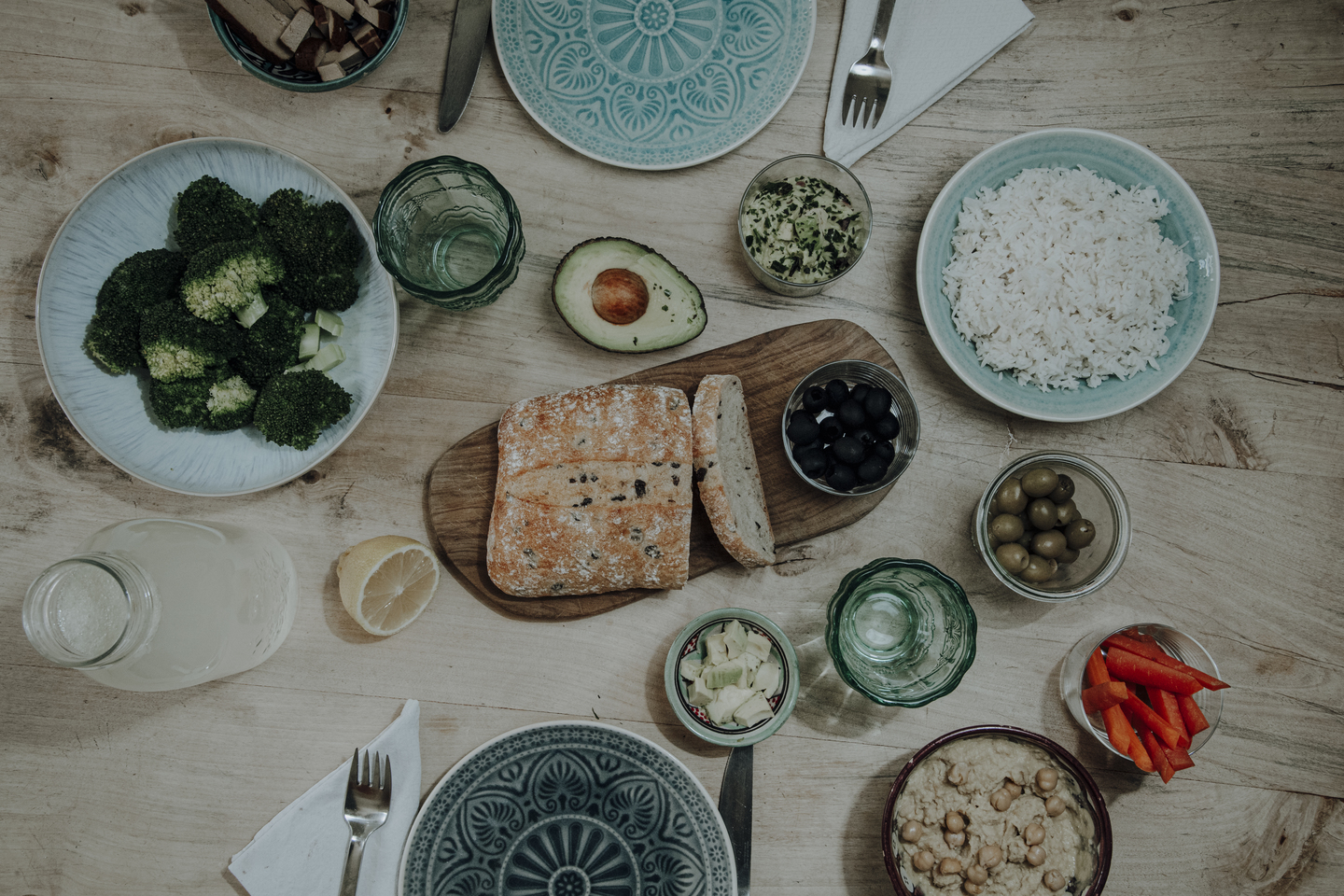What Is Balanced Nutrition?

The first steps towards a healthier diet
Nutrition trends are constantly changing - but generally speaking, the best way to eat healthy is to eat and drink everything in moderation. Carbonated and non-carbonated water, generally unsweetened beverages, plenty of vegetables and fruits, legumes, whole-food carbohydrates, proteins, high-quality fats, nuts, and minimal amounts of processed, high-fat or high-sugar snacks and beverages. [1]
By the way, even a vegetarian or vegan diet can be balanced, so malnutrition is ruled out in any case. [2]
For the vegetarians and vegans among you to be able to recreate our culinary European journey, we have made an effort to suggest balanced vegetarian and vegan recipe variations.
Breakfast first
If you've been starting your day with a nutrient-poor white bread with butter and cheese, a cornetto or other cake-like pastry, you can switch to a whole-food bread with delicious virgin olive oil and cheese as a first step, or replace your sweet breakfast with a muesli consisting of whole spelt flakes, fruit and a nuts from your region.
Lunch and dinner
The same goes for hot meals at lunch and dinner - the time you spend sitting around the table together with friends and family.
Instead of white flour pasta with ready-made tomato sauce, a homemade sauce made from fresh tomatoes, zucchini, peppers and other vegetables you like to eat is much healthier. And cooking together is also a lot of fun.
Of course, you shouldn't miss out on your favorite pasta. Just switching from pasta made from white flour to a delicious whole-grain version made from spelt flour will turn your pasta dish into a balanced meal.
Fats and carbohydrates
A balanced diet includes, among other things, carbohydrates in complex form (whole grain products). As for fats [3], saturated fats should be reduced and attention should be paid to the intake of omega-3 and omega-6 fatty acids. Therefore, you should avoid convenience products and look for high-quality oils (olive, walnut, linseed, pumpkin seed oil, etc.) as well as fish or algae products.
Sweets & Co.
It's okay to give into a "sweet temptation" now and then. Don't miss out on one or two pieces of chocolate, a little bit of your favorite cake or a tasty ice cream, as long as this does not constitute the main part of your nutrition.
But sweets can also be made healthier: For example, whole spelt flour can be used for cakes - it tastes deliciously nutty and is significantly more nutritious than white flour. In addition, you can use far less sugar when making your own cakes.
And let's face it: fruit is always good, preferably seasonal and regional. [4]
The best thing to do is to try to change your diet step by step to a balanced and wholesome version. If you replace the ingredients of your usual diet with healthier options, this should be much easier for you at first. Very important: You have to feel comfortable with it!
Are dietary supplements necessary?
If you eat a balanced diet, you will get almost all the substances your body needs in sufficient quantities.
Food supplements are only advisable if you suffer from a proven deficiency (e.g. iron, selenium, vitamin D). However, you should consult your doctor and have your blood values evaluated beforehand. Especially vegetarians and vegans can be deficient in omega-3 fatty acids and vitamin B12[5].
How does an unbalanced diet affect your health?
According to Isabel Drake, an epidemiology researcher at Lund University, it is not only the risk of type 2 diabetes and cardiovascular diseases that is reduced for those who eat healthily but there is also a clearly reduced risk of several forms of cancer. What you eat and drink affects your risk of cancer, but pointing out individual foods that cause cancer is usually difficult, and scientific support for an argument is often lacking[6].
The organization World Cancer Research Fund, WCRF, compiles and evaluates research on diet and cancer from many studies. WCRF assesses that there is strong scientific evidence that being overweight, and obesity increase the risk of 12 different types of cancer[7].
Therefore, the most important recommendation from the WCRF is to maintain a healthy weight.
Author: Petra Thaller, OAC
Sources:
[1] Cena; Calder. (2020). Defining a Healthy Diet: Evidence for the Role of Contemporary Dietary Patterns in Health and Disease. https://www.ncbi.nlm.nih.gov/pmc/articles/PMC7071223/
[2] Harvard T.H. Chan. (2022). Healthy plant-based diets better for the environment than less healthy plant-based diet. https://www.hsph.harvard.edu/news/press-releases/healthy-plant-based-diets-better-for-the-environment-than-less-healthy-plant-based-diets/
[3] Harvard Health Publishing. (2022). The truth about fats: the good, the bad, and the in-between.
[4] American Society of Clinical Oncology (ASCO). (2021). Does Sugar Cause Cancer? https://www.cancer.net/blog/2021-11/does-sugar-cause-cancer#:~:text=You%20might%20be%20wondering%20whether,too%20much%20sugar%20causes%20cancer.
[5] Cambridge University; Kent, Kehoe, Flynn, Walton. (2021). Plant-based diets: a review of the definitions and nutritional role in the adult diet. https://www.cambridge.org/core/journals/proceedings-of-the-nutrition-society/article/abs/plantbased-diets-a-review-of-the-definitions-and-nutritional-role-in-the-adult-diet/91C165CA3ABFAD9003AA42C1C0D49C89
[6] Cancerfonden. (2020). Så säger forskningen om kost och cancer. https://www.cancerfonden.se/nyhet/sa-sager-forskningen-om-kost-och-cancer.
[7] World Cancer Research Fund International. (2020) CO-CREATE. https://www.wcrf.org/policy/co-create/
